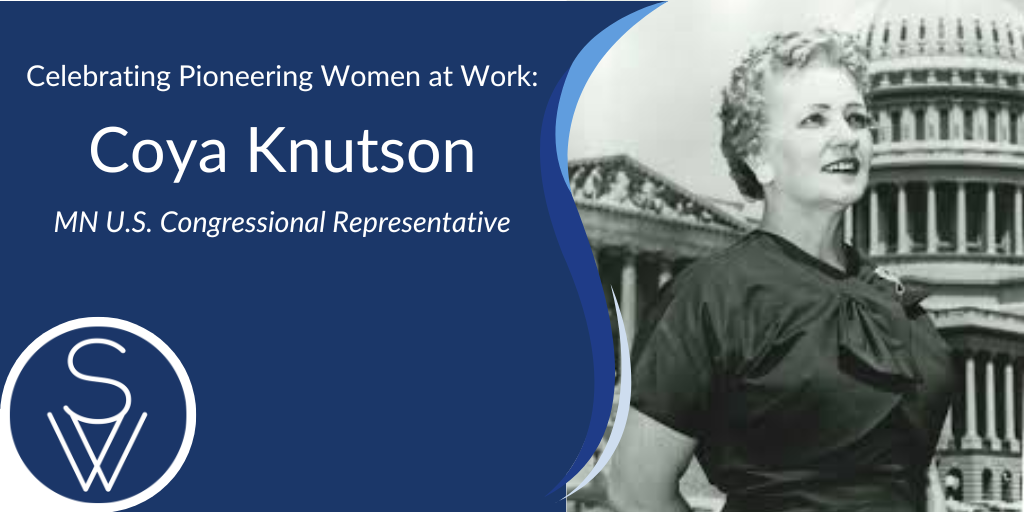Small Town, Big Dreams
Cornelia “Coya” Knutson always wanted to become an opera singer. It was a distant dream for a girl born in 1912 and raised on a small farm in North Dakota, but she went for it. After earning her degree from Concordia College in Moorhead, Minnesota, Knutson was admitted to the Juilliard School of Music. A year into it, though, she decided a career in music wasn’t for her.
For a brief interlude, her life seemed to take the turn that so many young women’s lives took in the 1930s. She returned home, got married, became a mother, and worked and worked and worked. She taught full-time. She ran the café in a small hotel she and her husband bought. She still sang—and played the accordion—at local gatherings.
She also had a secret: her marriage was fraught with discord and a growing threat of domestic abuse.
A Moment of Inspiration
Knutson liked to credit one experience for re-awakening her to her potential. It was the day she heard Eleanor Roosevelt speak. “It was as if the sun burned into me that day,” she said later.
A Life of Public Service is Launched
Energized by her new-found sense of purpose, Knutson began paying closer attention to the needs of her community. As her thoughts of running for local office took shape, she began campaigning in earnest, spending early mornings and many evenings meeting farm families in their fields and in their kitchens, asking them what they needed and what wasn’t working for them.
A Political Star Is Born
By the late 1940s, Knutson had established a reputation as a well-informed, ardent advocate for farmers. Soon, the Minnesota DFL recruited her to run for the state legislature in 1950. She ran on a platform that prioritized farmers’ rights, fighting workplace discrimination, improving state funding for education, and advocating for the under-represented, including migrant workers, children with disabilities, and people burdened by mental illness.
She won that race. She won it again two years later.
But there Were Strings Attached
The first sign of trouble came when the DFL asked Knutson to support their candidate in a national campaign: the race for Minnesota’s 9th district seat in the U.S. House of Representatives. Knutson declined, losing her DFL support.
Undoubtedly, she believed she was the better candidate. But in her later life, she openly acknowledged another reason: a congressional seat in Washington was a ticket out of the dangers at home. “I wanted to run for Congress and get out of there,” she reflected in 1991.
In a 1991 PBS interview, 79-year-old Knutson reflects on the uniquely Coya campaign methods she employed after losing DFL support. “I campaigned hard. Just went around the district and I sang at every wedding and every funeral there was.” Often, she accompanied herself on her accordion.
She won that seat, packed her things (including the accordion), and drove with her son to Washington, D.C.
Her legislative achievements still affect us today
From the moment she got there, the woman was a legislative powerhouse. With her strong ag cred, she became the first-ever woman to get a seat on the powerful U.S. House Agriculture Committee, overcoming the protests of her male peers.
Over her two terms, she authored 61 visionary, consequential bills, including the first federal student loan bill and a school lunch assistance program. Not surprisingly, the farmer voters who had sent her there loved her more than ever.
Meanwhile, a campaign of a very different sort was secretly taking shape
As Knutson’s successes in Washington grew, so did her husband’s resentment, drinking, and violence. “When he lost his meal ticket – me - he didn’t like that,” Knutson said afterward. Often, during her visits home over congressional breaks, she would wear sunglasses to hide the bruises.
Still, Knutson kept burning bridges with the Minnesota DFL, refusing to endorse DFL-backed candidates, favoring more ag-oriented candidates instead. This only strengthened the loyalty of her constituents, making her prospects for a third successful run look almost guaranteed.
An Unsolved Mystery
Shortly after, Knutson announced that the third run, a letter signed by her husband, had been mailed to her in Washington and published in newspapers across the country. It accused Coya of abandoning her “happy, happy home” to chase around with other men in Washington. “Tell the people of the 9th District…that you are through in politics. That you want to go home and make a home for your husband and son,” it demanded. Coya’s friends (and historians since) believed it was written and orchestrated by the Minnesota DFL. But no one tried to prove it.
The unyielding gender expectations of 1958 proved stronger than Coya Knutson’s moral compass or political will. Even her allies pulled away, including one of Minnesota’s most beloved women’s rights crusaders, Arvonne Fraser. The pressures to conform were too significant. “I saw it,” admits Fraser in a 2004 MPR interview, regretting her decision not to speak up. “I am one of the guilty… We didn’t stand up to defend her.”
Alone but refusing to bow down, Knutson stayed in that third race, losing by only 1,390 votes to Odin Langen, whose campaign slogan was “a big man for a man-sized job.”
To this day, no one has proven who was behind the letter campaign. But Knutson never won political office again. After briefly returning to Minnesota, divorcing her husband, and recalibrating her goals, she moved to New York to produce children’s television. She then returned to D.C., where she spent the rest of her career at the Department of Civil Defense.
Still, no regrets
Toward the end of her PBS interview, when asked if she would do anything differently, Knutson responded without hesitation: “Oh no. It was a rough row to hoe… but I wouldn’t have traded it for anything in my life.”








